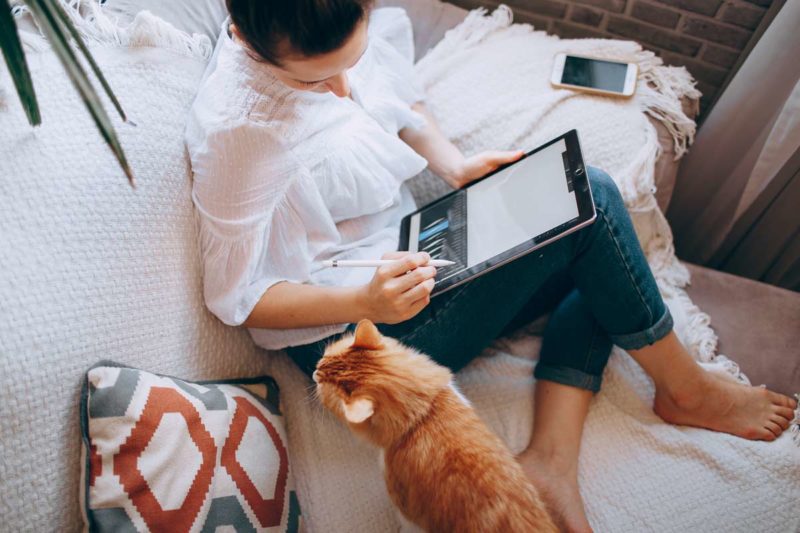There are many benefits to working remotely, but it is not always easy. Switching between your professional and personal lives in the same space can be difficult. Here are 7 tips for working remotely successfully and responsibly.
Focus your body and your mind on the « we »
The body and the mind need a kick-start to the day. To each their own: yoga, meditation, stretching, fifteen minutes of biking, all before a savoury (ideal) or sweet (but not very sweet) breakfast. If you’re not hungry in the morning, for a 100% clean start, drink a large glass of water in the morning. Follow up with a warm drink. Without water, cellular exchanges are not regular, so the brain and muscles function poorly. And even if you work from home get some fresh air: use 5 minutes to breathe by your window, a few moments for a self-massage or Qi Gong movement (tapping your arms, legs, and face to boost blood and lymph circulation). And off you go!
Get dressed
Logical and simple? Yet many people like to work in their pyjamas. But beware, while it may feel like the epitome of relaxation, it’s the easiest way to lose motivation. Simply because the brain is used to equating pyjamas with rest, it will start secreting all hormones and enzymes associated with the night cycle instead of switching to day mode. The most effective way to start the day is to always follow the same ritual so that your brain recognises it as the time to wake up (for example, 5 minutes of Qi Gong + shower + misting with Isotonic Nacre Water + a toning massage with your day cream + getting dressed). Rituals are the most efficient way to ensure the rhythm for the next 24 hours is optimised, which is why evening rituals are just as critical for falling asleep (getting into your pyjamas + applying your night-time serum + meditating + reading 3 pages of a book, etc.).
Be on time!
To successfully work remotely, follow your company’s pace. Establish your optimal working hours and stick to them so that you are in sync with your colleagues, staff, customers, suppliers, etc. Beware of the temptation of sleeping in late. If you can afford to wake up later, continue using an alarm clock, as it is a necessary part of the ritual. However, use a dawn simulator, listen to sounds of the sea or birds, or cheerful music. It’s the perfect formula for optimising your vibratory rate first thing in the morning.
Create a workspace
The living room is better than the bedroom (again, the brain associates the bedroom with night-time, not work). No matter the room you use (as you don’t always have the option to choose), make sure that your work area is clearly defined. If you live in a studio, it’s especially important to define your work area (for example, placing a sheet on the table to symbolise your office space, which you can remove once you’re done). Once your workday is over, close your laptop and store all your belongings in a bag or even a box, so that you don’t eat your meals surrounded by your equipment. Are you sharing your co-working space with a flatmate or partner? Everyone should have their own area, even if it’s only half a table. Sit in staggered rows rather than facing each other, so everyone has their own space.
Note
Revert back to using a physical diary. It’s a great way to bring some physicality to this virtual world where everyone interacts online. Work schedules, gym sessions, medical appointments, lunch breaks, ideas, projects – write them all down. And speaking of breaks, remember to take one every hour by walking a few steps. Take a deep breath by the window or in the garden if you have one. You’ll get your circulation moving again and get rid of fatigue.
Take a nap
Without feeling guilty, take a nap, even a short one, after lunch. That way, you’ll feel more energised for the rest of the day. But make sure you give this rest at least 10 minutes, what the British call a “power nap”, to boost your cognitive performance. While at home, lie down, draw the blinds slightly, and listen to a guided meditation, if you have trouble falling asleep in such a short amount of time. A 20 to 30-minute nap is ideal, as it leads to deeper sleep and reduces stress while boosting your mood and reducing the risk of cardiovascular problems.
Live in the moment
In short, concentrate fully on what you’re doing: when working, work, and don’t glance at social media. If you do, your attention will be diverted and it will take you a long time to reconnect with your work. If you’re truly “addicted”, plan stages in your work with specific objectives, and at the end treat yourself to some online connection as a reward. And to avoid temptation, put your phone away. Conversely, when you’ve finished working, avoid reading work emails. If you’re watching a film, cooking, or exercising, do it properly. Ready, set, go!







